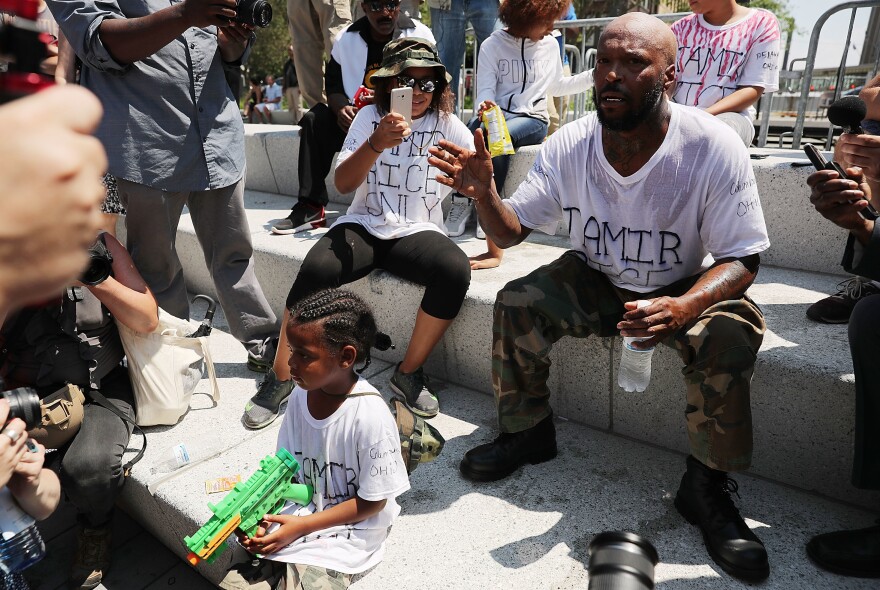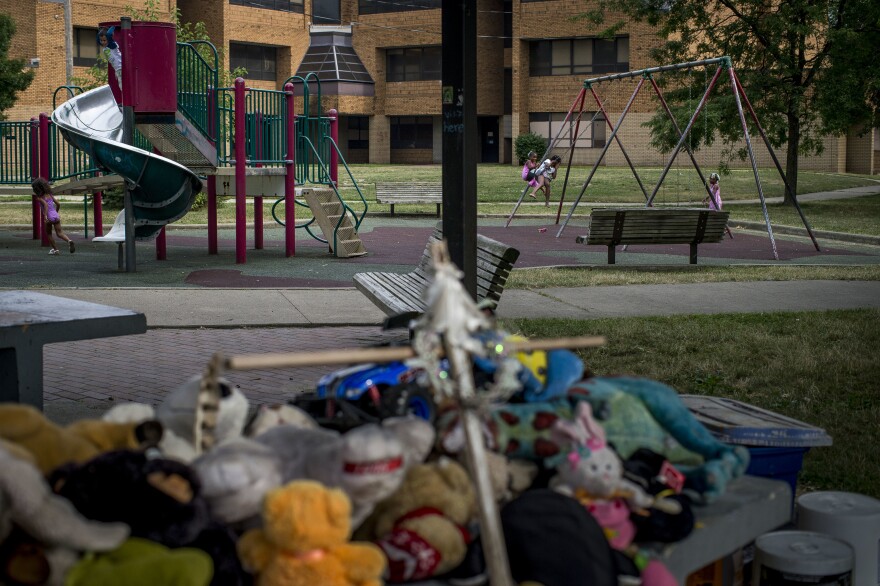Editor's Note: This piece contains language that some readers may find offensive.
It was a hot day in Cleveland at the height of the Republican National Convention and Stevedore Crawford Jr. was angry. He stomped through the city sweating through his white T-shirt, stopping at corners to denounce police. Right next to him was his young daughter, wearing the same camouflage pants as her dad. She also wore the same white T-shirt, scrawled with Tamir Rice's name.
Tamir was a 12-year-old boy killed by Cleveland police in November 2014.
Like Tamir, Crawford's daughter carried a toy gun. This one, however, wasn't a replica airsoft gun, but a bright green toy gun.
As he rounded a corner, Crawford stumbled upon four police officers — Indianapolis state troopers who had come to town to help Cleveland police patrol the Republican convention.
He stood right in front of them.

"I don't give a f*** about a pig," Crawford screamed. "And a pig don't give a f*** about me."
It was a scene that dramatized the raw feelings dominating a national debate on the relationship between police and people of color. Onstage and on the streets, the debate flared at both the Republican gathering in Cleveland and the Democratic National Convention in Philadelphia.
The divide on stage at the conventions mirrors deep division in the country over the Black Lives Matter movement and attitudes toward law enforcement. Four in 10 Americans say they support BLM according to a recent Pew survey that also revealed white Democrats were more than three times more likely than white Republicans to support it.
That day in Cleveland, the country was still reeling from the killing of police officers just a day before in Baton Rouge and just over a week before in Dallas. It felt like all of the protests, the killings of police and of young black men, and the riots had led to this moment of bald-faced confrontation.
"We are at a place of truth-telling in our history," Frank Leon Roberts, a professor at New York University who focuses on contemporary American social movements, said. We're at a point in history where cameras have forced a conversation about structural racism. "We're at a place where it's no longer possible to pretend it's not happening," Roberts said.
Pedestrians stopped. Some of them shook their heads.
Crawford paced back and forth, playing a game with police officers.

"Which one of you is a pig?" he asked. He pointed at one of the officers, looked him in the eyes and said, "You're not a pig."
He pointed at another officer. "You're a pig," Crawford said.
The officers were silent, their hands on their waists or folded in front of them. They looked straight ahead, no reaction apparent on their faces. Crawford stood there for seconds but it felt like an eternity, like that moment you hold your breath as a car spins out of control, and then finally exhale.
"We are missing the real issue in this world, in these United States," Crawford said. "Murdering a 12-year-old child by a police officer and everybody just living a normal life accepting it means that every human being in the United States should take a real good look at themselves, because they are not who they think they are. How can you sit back? How can you live your life ... watching a 12-year-old child being murdered by the cops ...?"
Crawford finally lowered his gaze and he moved along, his little girl following behind him with her toy gun in hand.
***
Later that day, a protest group took to the streets of Cleveland to denounce police.
"Indict, convict, send those killer cops to jail!" they chanted as they walked up Euclid Avenue.
Just a few blocks away from where Crawford confronted police, a Donald Trump supporter wearing a "Blue Lives Matter" button screamed at the protesters as they passed by. He would only give his name as Paul and say he was from Berea, just outside Cleveland, because he said he was afraid that someone might want to hurt him. He said he was angry at how little respect the protesters showed for police.
No, he said, he did not believe that African-Americans were the victims of systemic racism.
"These people's rap sheets are so long and you want us, the smart America, to buy this crap?" he said. "That these people didn't deserve to be shot? I would've shot them."
***
In some ways, the streets were just a more dramatic version of the kind of divide that was evident inside the Cleveland and Philadelphia arenas where the political parties gathered last month.
In her speech accepting the Democratic nomination, Hillary Clinton promised to reform the criminal justice system "end-to-end," while Trump channeled President Nixon, promising to "restore law and order in our country."
Keeanga-Yamahtta Taylor, an African-American studies professor at Princeton who wrote a book putting Black Lives Matter into historical perspective, said Democrats have cultivated a relationship with the movement in order to shore up the African-American vote this November. They haven't offered very many policy specifics, she said, beyond acknowledging that there's a problem with policing in the country.
The GOP focus on law and order, on the other hand, she said, was "a direct rebuke of the thousands of people who have been on the streets demanding that the police be reined in."
Former New York Mayor Rudy Giuliani, who came into the convention having said that the real danger to young black children is other black kids, thanked police.

"When they come to save your life, they don't ask if you are black or white, they just come to save you," Giuliani said to huge applause.
Perhaps the most striking surrogate on the issue for Trump, however, was Milwaukee County Sheriff David Clarke, who blasted the Black Lives Matter movement, saying their actions "transcend peaceful protest" and bleed into "anarchy."
Clarke began his speech by remembering the police officers who were killed in Dallas and Baton Rouge and also said there was "good news" out of Baltimore, where one of the officers charged in the death of Freddie Gray was acquitted.

The Democratic National Convention featured the Mothers of the Movement — a group of mothers whose children had been killed in high-profile incidents, many of them involving police.
Geneva Reed-Veal was one of them. She's the mother of Sandra Bland, a young black woman who was found hanged in her jail cell after police stopped and detained her following a traffic violation.
Reed-Veal was emotional, saying she was on that stage because Clinton is not afraid to "say our children's name."
"She knows that when a young black life is cut short, it's not just a loss," she said. "It's a personal loss. It's a national loss. It's a loss that diminishes all of us."
Taylor said that the police killings in Dallas and Baton Rouge complicated things for Democrats.
"The DNC was always going to make a concerted effort to reach to certain people in the movement," she said. "I think the events in Dallas and Baton Rouge made it important for the Democratic Party to show that it still is a party that is supportive of police and that also believes in law and order."
Attempts to strike that balance created some tension.
On the final night of the Democratic convention, Dallas County Sheriff Lupe Valdez came onstage to defend police officers, most of whom, she said, "are doing the best they can to protect our communities."
Valdez also called for dialogue and decried the shootings in Dallas and Baton Rouge.
"Violence is not the answer," she said.
Then she asked for a moment of silence. As it came to an end and before Valdez introduced the families of fallen officers, two people in the crowd screamed, "Black lives matter!"

***
In Cleveland, the killing of Tamir Rice still casts a shadow on the relationship between the community and the police.
At the recreation center where Tamir was killed, a memorial remains. Teddy bears and artificial flowers crowd the little gazebo that became emblematic of the shooting.
On that cold, fall day, Tamir was playing with a replica gun when someone called police. Seconds after arriving and just as he stepped out of his police cruiser, Officer Timothy Loehmann opened fire. A grand jury declined to bring charges and Tamir's case became a rallying cry for the Black Lives Matter movement.

Tamir's mother, Samaria Rice, has become an outspoken critic of both political parties.
Tamir's death, she said, changed her deeply. She's a woman with a criminal record and, as she puts it, has had many interactions with police.
"I haven't had one of those racist cops. I have never experienced it," she said. "I thought they were here to help us at the end of the day and it's just like my eyes were covered until my son got murdered."
Rice said that she's still trying to come to terms with what happened. She doesn't understand why Officer Loehmann was not charged and she doesn't understand why black men continue to be killed by police.
In the weeks leading up the RNC, Alton Sterling, who was selling CDs outside a convenience store, was killed by police in Louisiana and Philando Castile was killed by police during a traffic stop in Minnesota.
Rice said she doesn't understand why the country has retreated to ideological corners — black lives vs. blue lives. To Rice, that's just a symbol of a country in turmoil, a country in desperate need of a reckoning, but with a political class unwilling to help it.
"People are living in fear and the police is living in fear, too," Rice said. "I think America should have an open dialogue, because it's not gonna get any better. If they don't [the country] is going to crash. It's going to crumble right before our eyes."
Copyright 2020 NPR. To see more, visit https://www.npr.org. 9(MDAxMzY2MjQ0MDEyMzcyMDQ5MzBhZWU5NA001))




